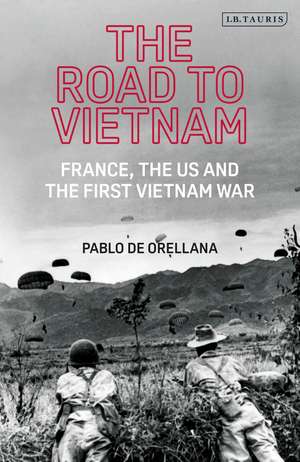The Road to Vietnam: America, France, Britain, and the First Vietnam War
Autor Pablo de Orellanaen Limba Engleză Paperback – 8 sep 2021
| Toate formatele și edițiile | Preț | Express |
|---|---|---|
| Paperback (1) | 218.47 lei 6-8 săpt. | |
| Bloomsbury Publishing – 8 sep 2021 | 218.47 lei 6-8 săpt. | |
| Hardback (1) | 598.84 lei 6-8 săpt. | |
| Bloomsbury Publishing – 19 feb 2020 | 598.84 lei 6-8 săpt. |
Preț: 218.47 lei
Preț vechi: 275.30 lei
-21% Nou
Puncte Express: 328
Preț estimativ în valută:
41.80€ • 43.74$ • 34.73£
41.80€ • 43.74$ • 34.73£
Carte tipărită la comandă
Livrare economică 02-16 aprilie
Preluare comenzi: 021 569.72.76
Specificații
ISBN-13: 9780755637126
ISBN-10: 0755637127
Pagini: 272
Ilustrații: 10 bw illus
Dimensiuni: 156 x 234 x 25 mm
Greutate: 0.39 kg
Editura: Bloomsbury Publishing
Colecția I.B.Tauris
Locul publicării:London, United Kingdom
ISBN-10: 0755637127
Pagini: 272
Ilustrații: 10 bw illus
Dimensiuni: 156 x 234 x 25 mm
Greutate: 0.39 kg
Editura: Bloomsbury Publishing
Colecția I.B.Tauris
Locul publicării:London, United Kingdom
Caracteristici
Study using history and political theory in a way that will be of interest to students of US history, colonial history, postcolonial theory and international relations
Notă biografică
Dr Pablo de Orellana is a Lecturer in International Relations at the War Studies Department, King's College London, UK.
Cuprins
AcknowledgementsAbbreviationsFiguresPreludePART I OUVERTURES1. The Road to Vietnam: historical debates, and the question of representationHistorical debatesConstructing diplomatic understanding of France and VietminhUnderstanding representation in diplomacy: historical and conceptual requirements2. Reading diplomatic knowledge: analytics and sourcesConceptual developments: Postructuralism, identity, and textAnalysing representation of identity in diplomacy: from concepts to methodsOn the archival trail of the First Vietnam War: sources3. Diplomatic pathwaysPART II DIPLOMATIC TEXT AND THE WORDS OF IDENTITY1. The Vietminh rebel alliance: universal rights and self-determination2. The French Empire strikes back: aggression against Ð?c L?p3. Vietminh as Fascists: Vietnam does not exist4. Vietminh as Communists: 'Moscow's interest in Indo-China'5. A 'united front' and 'the left-wing trend of the Viet-Minh'6. D'Argenlieu's 'sudden raising of the Communist bogey'7. Meeting 'radical Annamese opponents of both France and Japan'8. Creating Pyle's "Third Force": 'a truly nationalist government'PART III DIPLOMATIC STRUGGLES OVER IDENTITY 1948-19451. Late 1948-September 1947: the year of the Stalinist dominoFranceBritainUSVietminh2. August 1947-September 1946: French intransigence and Anglo-Saxon antipathyFranceBritainUSVietminh3. August 1946-April 1945: WWII ghosts and rethinking colonialismFranceBritainUSVietminhEpilogueNOTESBIBLIOGRAPHY
Recenzii
Insightful and persuasive.
The Road to Vietnam accomplishes a remarkable feat: saying something truly fresh and important about the origins of the U.S. embroilment in Vietnam, a topic that historians have investigated from innumerable angles over many years. Through meticulous analysis of evidence from three countries and dexterous use of cultural theory, Pablo de Orellana convincingly shows how policymakers crafted a particular understanding of Vietnam and the country's significance to the Cold War. In the process, De Orellana models an approach that scholars would do well to apply to other international conflicts.
The Road to Vietnam accomplishes a remarkable feat: saying something truly fresh and important about the origins of the U.S. embroilment in Vietnam, a topic that historians have investigated from innumerable angles over many years. Through meticulous analysis of evidence from three countries and dexterous use of cultural theory, Pablo de Orellana convincingly shows how policymakers crafted a particular understanding of Vietnam and the country's significance to the Cold War. In the process, De Orellana models an approach that scholars would do well to apply to other international conflicts.
